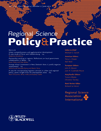
Regional Science Policy and Practice
Scope & Guideline
Elevating discourse on regional science and its practical implications.
Introduction
Aims and Scopes
- Regional Development Analysis:
The journal emphasizes empirical and theoretical studies on regional development, investigating economic growth, disparities, and convergence across different regions. - Spatial Dynamics and Urbanization:
Research on urbanization processes, spatial patterns, and their implications for regional planning and policy is a core focus, examining how urban environments evolve and impact surrounding areas. - Environmental Sustainability and Climate Change:
The journal addresses the intersection of regional development and environmental issues, including climate resilience, sustainable resource management, and ecological impacts of regional policies. - Socioeconomic Inequalities:
Exploration of social inequalities and their spatial dimensions is a key area, investigating how demographic factors influence access to resources and opportunities in various regions. - Innovative Regional Policies:
The journal promotes studies on innovative policy frameworks and practices that foster regional competitiveness, economic resilience, and social welfare. - Interdisciplinary Approaches:
Encouraging interdisciplinary research methodologies, the journal integrates perspectives from economics, geography, sociology, and environmental science to provide comprehensive insights into regional issues.
Trending and Emerging
- Resilience and Recovery Post-COVID-19:
A significant trend is the focus on resilience and recovery strategies in the wake of the COVID-19 pandemic, with research exploring how regions can adapt and recover from socio-economic shocks. - Digital Transformation and Smart Cities:
Emerging studies on digital transformation and the development of smart cities highlight the integration of technology in urban planning and regional development, emphasizing innovation and efficiency. - Climate Adaptation and Mitigation Strategies:
Research increasingly emphasizes the need for effective climate adaptation and mitigation strategies within regional policies, reflecting the urgent need to address climate change impacts. - Social Justice and Equity:
There is a growing focus on social justice and equity in regional development, examining how policies can promote inclusivity and address disparities among various demographic groups. - Interconnectedness of Global Supply Chains:
Emerging themes explore the interconnectedness of global supply chains and their impact on regional economies, especially in light of recent disruptions due to geopolitical tensions and pandemics.
Declining or Waning
- Traditional Industrial Economics:
Research focused on traditional industrial economics has waned, as the journal increasingly prioritizes studies that incorporate broader social and environmental contexts. - Rural Development without Urban Context:
There has been a noticeable decline in papers examining rural development issues in isolation from urban dynamics, indicating a shift towards integrated urban-rural studies. - Static Economic Models:
The reliance on static economic models is decreasing, as there is a growing preference for dynamic and complex systems approaches that better reflect real-world scenarios. - Single-Factor Analysis:
Studies that focus on single factors influencing regional development are less common, as researchers move towards multi-dimensional analyses that consider interrelated variables. - Outdated Policy Frameworks:
Research that promotes outdated or less relevant policy frameworks is declining as the journal seeks to champion innovative and adaptive policy solutions.
Similar Journals

Zhurnal Novaya Ekonomicheskaya Assotsiatsiya-Journal of the New Economic Association
Bridging Theory and Practice in Finance and EconomicsZhurnal Novaya Ekonomicheskaya Assotsiatsiya-Journal of the New Economic Association, published by CONSAS CONFERENCE, is a pivotal platform for advancing research in the fields of economics and finance. With an ISSN of 2221-2264, this journal facilitates the dissemination of innovative and insightful research findings that contribute to the understanding of contemporary economic issues. Operating as an open-access journal, it ensures broad accessibility for researchers, professionals, and students engaged in economic studies. The journal’s recent recognition within the Q4 category in Economics and Econometrics, alongside a Q3 classification in Finance for 2023, highlights its growing significance within the academic community. Despite its relatively nascent journey from 2016 to 2024, the journal, based in the Russian Federation with an address at VAN DER STERR BLDG, RHODES DR, MOWBRAY 7785, SOUTH AFRICA, contributes crucial scholarly dialogue by welcoming diverse perspectives and methodologies. By prioritizing rigorous research and comprehensive review processes, it aims to elevate the standards of economic discourse and facilitate impactful exchanges among scholars worldwide.
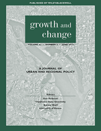
GROWTH AND CHANGE
Navigating the challenges of a rapidly changing world.GROWTH AND CHANGE is a prestigious academic journal published by Wiley, focusing on the interdisciplinary study of global and planetary change. Since its inception in 1970, this journal has served as a critical platform for researchers and scholars who seek to explore the complexities of social, economic, and environmental transformations occurring worldwide. With an impressive impact factor and renowned for its rigor, it currently holds a Q2 ranking in the Global and Planetary Change category as per the latest metrics. GROWTH AND CHANGE can be accessed through traditional subscriptions, catering to a broad audience including professionals and academic institutions. Its objectives revolve around advancing knowledge and fostering critical discussions that illuminate the challenges posed by rapid change and growth in our environments. Positioned at the forefront of debates in sustainability and development, this journal is indispensable for anyone vested in understanding and addressing the interconnected issues of our changing world.
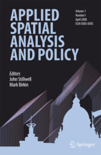
Applied Spatial Analysis and Policy
Exploring the intersection of geography and governance.Applied Spatial Analysis and Policy, published by Springer, is a leading journal dedicated to advancing knowledge in the field of spatial analysis and its application in policy-making. With an ISSN of 1874-463X and an E-ISSN of 1874-4621, this peer-reviewed journal has been at the forefront of geographical research since its inception in 2009 and continues to thrive with a convergence extending to 2024. As a recognized publication in the Geography, Planning and Development category, it holds a commendable Q2 quartile ranking for 2023 and is positioned at rank #238 out of 821 in the Scopus classification, reflecting its strong impact and relevance within the academic community with a percentile of 71. The journal provides a robust platform for researchers and professionals to explore innovative methodologies and empirical studies that enrich spatial policy frameworks. While access to individual articles is not open access, its significant contribution to the field makes it a vital resource for anyone involved in spatial analysis and related disciplines.

Ter es Tarsadalom
Navigating the Complexities of Social and Economic IssuesTer es Tarsadalom is a leading open access journal published by the CENTRE ECONOMIC & REGIONAL STUDIES at the HUNGARIAN ACADEMY OF SCIENCES, INSTITUTE OF REGIONAL STUDIES. With the ISSN 2062-9923, this journal serves as a vital platform for scholars and practitioners working in the fields of social sciences, regional studies, and economic development. Since adopting an open access model in 2022, Ter es Tarsadalom has committed to making high-quality research widely accessible, driving innovation and collaboration among researchers, professionals, and students alike. The journal aims to foster discussions on pressing social issues, regional disparities, and economic policies, providing a comprehensive forum for multidisciplinary research. Its rigorous peer-review process ensures that published articles meet the highest academic standards, empowering the community with impactful knowledge that can inspire change in regional planning and policy formulation.

Revista de Estudios Regionales
Advancing Knowledge in Social Sciences.Revista de Estudios Regionales is a distinguished academic journal published by ASOC UNIV PUBLICAS ANDALUCIA-AUPA, focusing on various fundamental areas in the social sciences, including development, economics, sociology, and political science. Established in 1978 and converging its publication years to include recent contributions until 2024, the journal serves as a critical platform for international scholars and practitioners interested in the regional dynamics of Spain and beyond. Despite its current Q4 ranking in key categories such as Development, Economics, and Sociology, the journal aims to elevate discourse and foster a deeper understanding of regional studies, ultimately contributing to policy-making and academic dialogue. Accessible to readers without open-access provisions, this journal is a valuable resource for those seeking to engage with the latest theoretical and empirical research in the field. Scholars, graduate students, and policy professionals will find the journal’s insights particularly beneficial for advancing their work and understanding of regional phenomena.
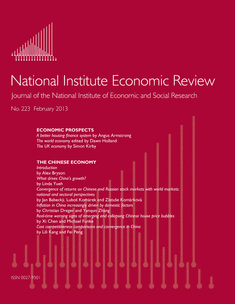
National Institute Economic Review
Illuminating pressing economic issues with scholarly precision.National Institute Economic Review, published by CAMBRIDGE UNIVERSITY PRESS, stands as a pivotal academic journal within the realms of Economics, Econometrics, and Finance. Since its inception in 1960, this journal has continually provided insightful research and analyses that address pressing economic issues, making significant contributions to both theoretical and applied economics. With a notable Q1 category ranking in the 2023 Scimago Journal Rank, it is recognized as a leading publication in its field, currently ranked #62 out of 288 in Scopus. The journal aspires to foster a deeper understanding of complex economic phenomena, offering a platform for both established and emerging scholars. While it operates under a traditional access model, the integrity and rigor of the content ensure its relevance and utility for researchers, professionals, and students alike. The interdisciplinary approach taken in the articles published not only enhances the comprehension of economic policies but also encourages dialogue among diverse economic theorists and practitioners worldwide.

Review of Regional Research-Jahrbuch fur Regionalwissenschaft
Advancing Regional Insights for a Sustainable FutureReview of Regional Research-Jahrbuch fur Regionalwissenschaft, published by SPRINGER HEIDELBERG, is a pivotal academic journal dedicated to the interdisciplinary exploration of regional science, economics, and geographical studies. With a strong presence in Germany and an impressive range of topics, this journal serves as a vital platform for scholars, researchers, and practitioners aiming to advance knowledge in regional development and planning. The journal has achieved notable recognition, being categorized in the Q3 quartile in Economics and Econometrics and Q2 in both Geography, Planning and Development and Social Sciences (miscellaneous), highlighting its importance in contemporary academic discourse. The Scopus rankings further affirm its relevance, with an impressive percentile ranking across its categories. Although it operates under traditional access options, the journal's robust editorial oversight ensures high-quality research dissemination from 1998 through 2024, making it essential for anyone invested in the critical dynamics of regional studies.
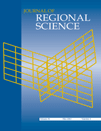
JOURNAL OF REGIONAL SCIENCE
Unveiling Critical Studies in Regional Science and DevelopmentJOURNAL OF REGIONAL SCIENCE, published by Wiley, stands as a leading forum for the dissemination of innovative research in the fields of regional development and environmental science. With an impactful presence since 1958, this highly regarded journal boasts a robust ranking within the Q1 category in both Development and Environmental Science (miscellaneous), reflecting its influence and importance in these domains. Researchers can explore a wealth of critical studies that address diverse issues impacting regions across the globe, facilitating multidisciplinary dialogue essential for addressing contemporary challenges. The journal is indexed with an impact factor that underscores its scholarly significance, rendering it an indispensable resource for professionals, researchers, and students seeking to engage with cutting-edge developments in regional science. Although it does not operate under an Open Access model, the wealth of insights offered continues to contribute substantially to the field.

Regional Statistics
Unlocking Insights Through Statistical AnalysisRegional Statistics, published by the Hungarian Central Statistical Office, is a leading scholarly journal that plays a pivotal role in enhancing the understanding of regional development and statistical analysis. With its ISSN 2063-9538 and E-ISSN 2064-8243, this open-access journal contributes significantly to various fields, including Cultural Studies, Economics, Geography, and Public Administration. The journal has established itself with impressive Scopus rankings, placing it in the top percentiles across multiple categories, evidencing its high-quality research outputs. Covering converged years from 2015 to 2024, Regional Statistics publishes insightful articles that address pressing regional issues, making it an invaluable resource for researchers, professionals, and students alike who are interested in the quantitative dimensions of society. With a reputation bolstered by its Q1 and Q2 categorizations in various disciplines, this journal is not only committed to advancing statistical knowledge but also to fostering interdisciplinary dialogue among statisticians, policymakers, and social scientists.

PAPERS IN REGIONAL SCIENCE
Shaping the future of regional development through research.PAPERS IN REGIONAL SCIENCE, published by Wiley, is a leading international journal dedicated to advancing the understanding of regional science and interdisciplinary approaches to geography and environmental planning. With an impressive impact factor and a prestigious Q1 ranking in both Environmental Science and Geography, Planning and Development, this journal serves as a critical platform for disseminating high-quality research from 1955 to 2024. Covering a diverse scope including regional development, spatial analysis, and environmental issues, it facilitates discussion and knowledge exchange among scholars and practitioners. The journal is recognized for its rigorous peer-review process and its commitment to addressing pressing societal challenges through research. As a vital resource for researchers, professionals, and students alike, PAPERS IN REGIONAL SCIENCE fosters innovation and collaboration within the field, contributing to a deeper understanding of the complexities of regional systems.